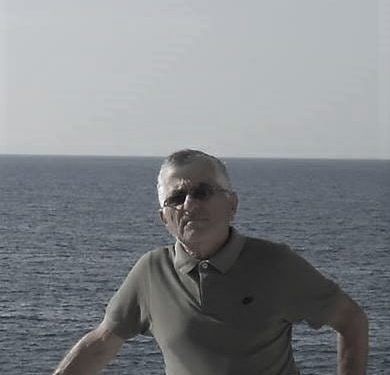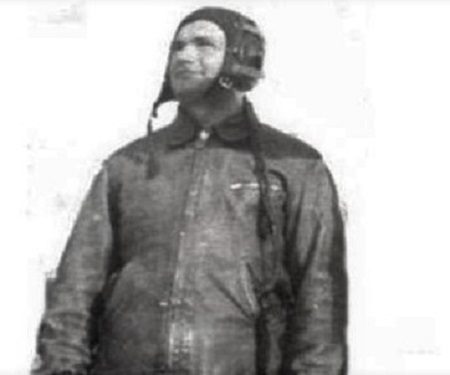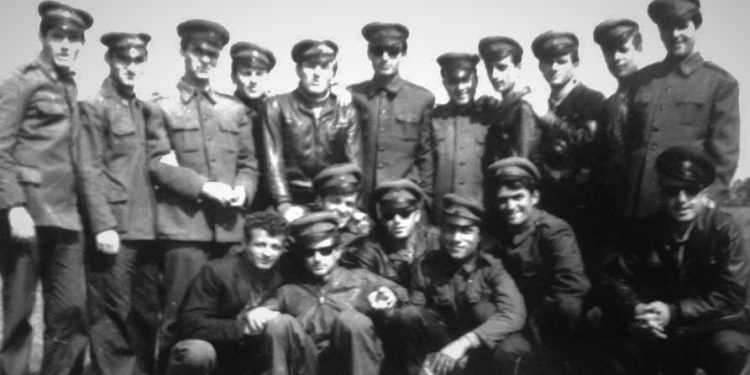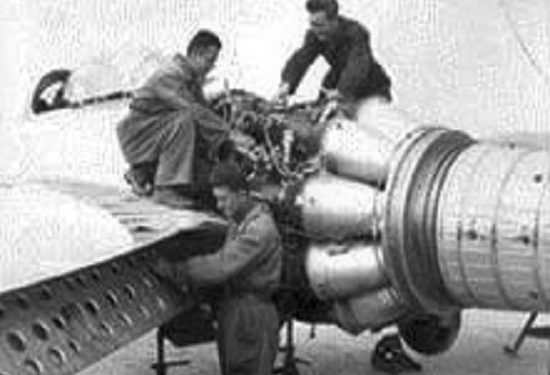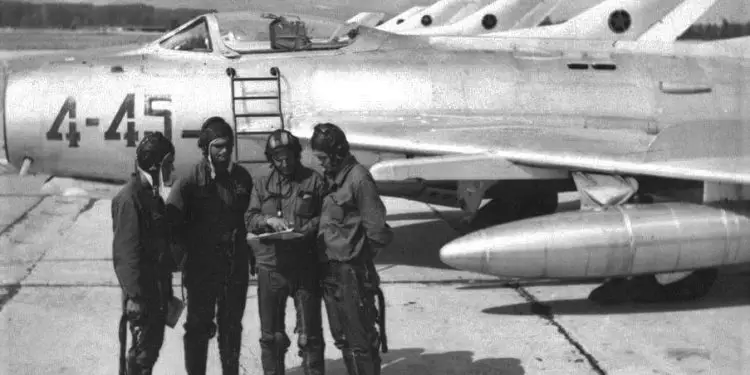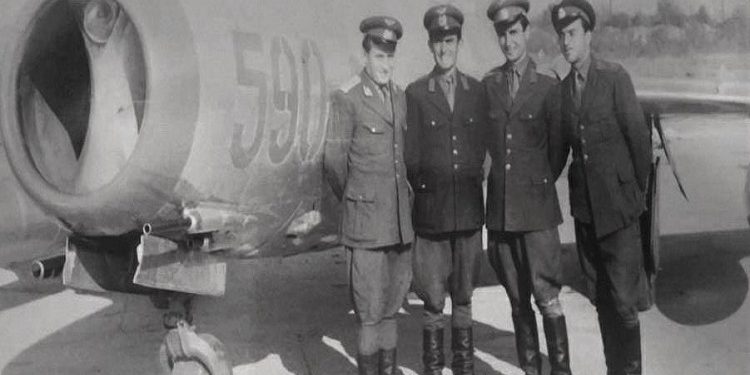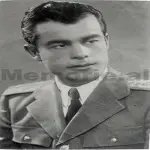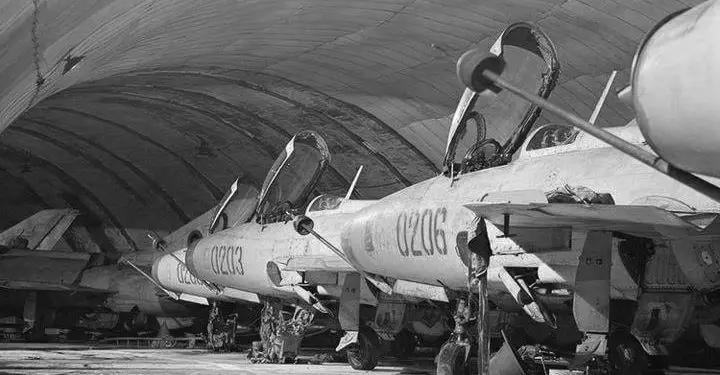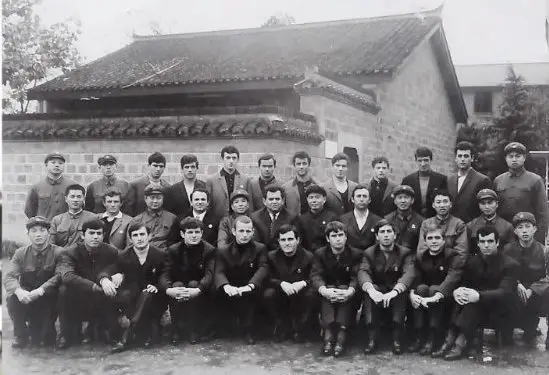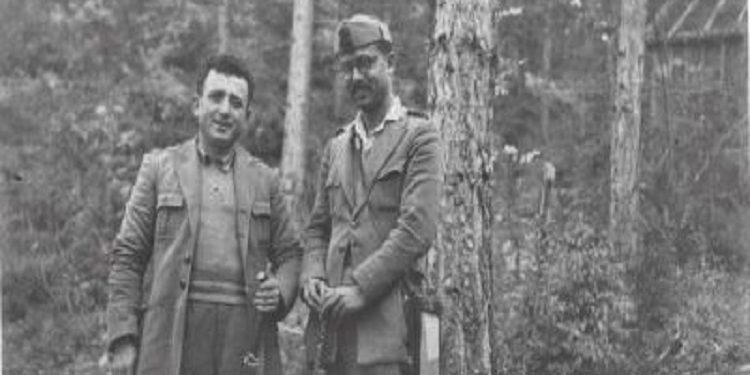By Niazi Nelaj
Second part
– At the Chinese Military Aviation School –
Memorie.al / Expelled from the Soviet School of Aviation, with dreams cut in half, part of the group of student pilots, who had studied for a year in the city of Bataysk, on January 8, 1962, after a “hell” cruise ”, with a cargo ship, we arrived at the center of China’s Third Military Aviation School in Chin Zhou City. It is located in the “heart” of Manchuria; at that time there were about 200,000 inhabitants. Without any prominent industry. A city with 2-3 story buildings but paved roads. The terrain around the city was plain; next to it are the Western shores of the Yellow Sea. One of the values of this city was the fact that it was the center of China’s Third Military Aviation School. My going to this school and that city was a lucky chance. In the list of 7 students of our course, which included: Adem Çeça, Dhori Zhezha, Mihal Pano, Bashkim Agolli, Andrea Toli and Sherif Hajnaj (Bracki), my name, Niazi Nelaj, was included, quite by chance?
Continues from last issue
He was showing us the bedroom, a small warehouse for 7 beds, single, with one floor, one of the cadres, “the heaviest”, spoke incessantly. Whatever he did, he gave a political emphasis to the story of the vault room objects. He spoke in his own language and we did not understand what he said, but from the tone in which he articulated the speech, we understood that he was evoking the great, unbreakable Albanian-Chinese friendship, built on the foundations of war, without compromise against revisionism modern, with Khrushchev at the top.
The orator, with pathos, praised the two architects of this friendship: Mao Zedong and Enver Hoxha. He, in a pleading voice, seemed to be apologizing that we, dear friends, who came from Socialist Albania, were in his country at a time of economic crisis, when there had been no rain during the last three years. I heard this kind of excuse often during my time in China.
The Chinese had christened the lack of rainfall, and consequently of the harvest, with the phrase “natural disaster”, an expression which they liked to repeat in Russian: “Stihijnije bjedstvija”. In any case, the economic constraints we experienced in China, as the locals tried to explain, were closely related to the natural disaster. With this logic, the talkative boss also spoke to us. He and the others, who carried “iso” and beat the same drums, were in trouble:
We were expelled from the Soviet Union, where, to tell the truth, we found better living conditions than what we left in our country, and the Russians took care of us so that we lacked nothing. The Chinese, careful as they are towards guests, did not want to sit in the “piaca”, so they tried to put us in comfortable conditions. However, a few months before us, to continue the interrupted flights, some student pilots, of mixed groups, had arrived in China.
Some of them had been promoted and were officers of the People’s Army; others were students. Along with these, a military delegation went to China, which included the commander of the Albanian Air Force, Colonel Edip Ohri. Among the many orders he had left, the colonel had told the Chinese Aviation authorities: “Albanian Aviation students and officers, you treat them the same as your own”! The orders of the commander of the Albanian Aviation were welcomed and appreciated by the locals. They paved the way for what happened afterwards, which, for us, did not turn out to be so useful.
The orders of the Albanian Chief of Aviation came well after the Chinese leaders of the Combat Aviation, whose students and officers trained and lived in conditions in which we had difficulty coping. When we studied at the Soviet Aviation School, we were the darlings of the regime. We were used to “loosen the belt”, and swim in abundance; now we had to “tighten the belt” again, and experience restrictions, which even in the poor Albania of that time, I did not often match.
The Chinese soldier, compared to the Soviet one, experienced unprecedented economic constraints. Chinese officers did not have the most prosperous living. Well, I’ll have time to write about these things later, now let’s go back to our first presentation. One of the senior officers of the suite that accompanied the “big boss”, as he stood, standing in front of us, without tikab (shyness) let out a pretty p….! The Chinese people present heard what I don’t want to say twice, but they weren’t worried at all. As if nothing had happened.
We, the students who came from Albania, not yet used to Chinese, looked each other in the eyes, blushed and were ashamed, lowered our heads and laughed under our breath. It is an understatement to say that we were offended; we were not taxed. Then we often heard such shows, but they no longer impressed us; we were taught to listen to them but not to apply them. While we were alarmed, the orator continued the story of the objects, without any harm. We saw the bedroom.
We, the students, separated from the Batajsk group, were 7 of us: Adem Çeça, Dhori Zhezha, Mihal Pano, Bashkim Agolli, Andrea Toli Sherif Hajnaj (Bracki) and Niazi Nelaj. To sleep we were directed to the same room. The students of the navigator group, those who had studied in Krasnodar, for flying navigators and came to China to undergo training as pilots, who were more numerous, would sleep in other rooms; in conditions like ours. Like us, also the group of officers, who trained somewhere 200 km. further away, who had flown, to Krasnodar, in front-line bomber planes ‘IL-28’.
They came to China to train in MiG-15 Bis aircraft. They claimed differential treatment, compared to us students, and material benefits, according to the advantages that officer rank gave them. If they could not be treated like Soviet officers, at least they were given the benefits they were entitled to as officers of their country. However, the Chinese managers who dealt with these jobs had received instructions from the commander of the Albanian Aviation for our treatment; that’s why they put us “in a sack”.
The officers who were studying to be pilots revolted and protested, but in the face of Chinese insistence and the stubbornness and determination of our government, they preferred to interrupt or not start the air training, as a result they returned to Albania, where some were released from the army and others were assigned to various non-flying duties. They were good guys and promising pilots. With a colder and wiser treatment, perhaps they would not have paid so badly. Our aviation suffered worse, losing a generation of valuable pilots.
From the very first presentation, the sleeping conditions did not suit us. The beds were bunk, single and made of wood. So far – normal. The bad, neither begins nor ends here. To lie on top of the boards, they provided us with a quilt, with which we had to cover ourselves. No sheets. He only had the name quilt, because he was very thin. Lying on the boards of the bed, our ribs hurt, as it was no use as a cover, and we were cold.
We used to double him and get inside him. When I was a child, my mother told me about an incident involving her cousin Halil Adem Halilaj, from Wing No. 1 of Tepelena. This Halil, whom, as my mother’s cousin, I called dajo, was a handsome man: “snaf”, handsome, smart and humorous, brave and good with people, master of the German language and several other languages. Together with some fellow villagers, and others from the surroundings, uncle Halili used to go to Fier, to do shopping.
Grouped in a caravan, they made the 10-12 hour journey on foot. At that time, the roads where the caravans traveled were full of robbers. Therefore, the villagers were forced to group. Night took them in the field of Cakran. They chose a suitable place for themselves and the animals they were traveling with and decided to spend the night at some hay and straw millers. The night was cold and the clothes they had for bedding and covering were thrown to the animals.
They gathered some scraps nearby and made a fire, from which they were rather drunk. They warmed up from the front; they were cold from the back. They did as they did, spread grass and straw and, tired from the long journey, lay down. They could not sleep because of the cold. One of the villagers, who were not “getting” sleep from the cold, asked Halil: “What about you Uncle Halil, didn’t you pass out?” “No,” answered the noble old man, “I didn’t fart before”! The villager continued the question: “What did you throw?” “A sack”, answered Halil. “And to throw, what did you use”? Asked the villager. “A sack”, said uncle Halili again. The villager was happy, that the old man had two sacks and shouted: “Give me a sack, because I got fed up, uncle Halil”! Halil Ademi, with his well-known humor, with a certain solemnity that gave him the status of the leader of the caravans, pleasantly said: “Yes, I have a sack and I got inside it”. Those who pretended to be asleep heard it and the gas exploded, there among the millers of Cakran.
The interesting event has been told and told in vain, in our tribal circle and beyond. Uncle Halil’s son’s son, in recent years, became one of the most popular comedians in Shkodër and throughout the country. I remove the door. They don’t say in vain in our country: “Pear, it will fall under the pear”!
I extended it a bit with the story of this distant event in time, to remember another experience, not so fresh. A carved wooden table was placed in the middle of the room where we slept, around which we sat and “pushed away the free hours”. The table had the shape of a rectangle and 6 people could sit around it. We were 7 friends. One was left without a place. In silence, according to the “law of the jungle” it was well accepted that Misha (Mihal Pano) from Tirana was left without a place. Misha was the youngest in age and the smallest in body.
Even Misha himself agreed with this solution, not at all humane. At the head of each bed we had a wooden chest of drawers, with two shelves. On the chest of drawers and inside it, our careful hosts had not overlooked the stacking of many works. The works were classics of Marxism-Leninism, mainly in the Russian language. There were works by Karl Marx and Frederik Engels, such as ‘Capital’, ‘Selected Works’, ‘Anti Dyhring’, ’18 Brymeri’ by Louis Bonaparte, etc., works, edition of Leipzig, etc. All beautifully bound, with hard covers and quality paper.
The series of works of Josif Visarianovich Stalin, whom the locals were very fond of, were numbers 1 to 14 and his selected works. They and the selected works of Vladimir Ilyich Lenin filled our bedside tables. Above all, the selected works of Chairman Mao Zedong stood out. The books of their chief, whom they wished to live 10,000 years and worshiped as a god, were beautifully bound, with thick covers and “shirts” over them, provided with a red ribbon to mark the pages. . On the cap and shirt of Mao Zedong’s works, a large, yellow stamp with Chairman Mao’s face shone. Careful and knowledgeable in matters of maintaining balance, the organizers had filled our library with books and titles from the writings of comrade Enver Hoxha.
Since we were expelled from the Soviet Union, with which, at that time, the Chinese were not in agreement on ideological issues and were divided in political positions, to “shake off the revisionist dust” that could have fallen on us, the leaders of the sector political school, “we were bombarded” with Marxist-Leninist political literature. Maybe they thought we were eager to learn Marxism-Leninism at that age. I emphasize that, in those years, in China, political literature circulated widely and was fashionable. The one who didn’t hold Chairman Mao’s quotes in his hand, didn’t repeat them out of place, was looked at askance by the political leaders.
In the 1960s, television was in its infancy in China. In our room, where we spent most of our time, we had only an ordinary tube radio. It served us to learn the latest announcements and listen to music, which, for the sake of truth, we liked a lot. We were in trouble, who and how would run this radio, alone. The friends killed it and soon found a way to use it. My friends entrusted me with the “management” of the radio. We put the radio on my nightstand.
We usually listened to the news, some music program, with songs according to my preferences. In some cases, also according to the requests of friends, who wanted to watch music shows, when they were around the table, but also lying in their beds, before falling asleep.
This was difficult, as quiet was required and the size of the hall where we slept required me to keep the volume of the radio at elevated levels. The internal rule did not allow us to disturb others, in the time of rest. In matters of enforcing the rules, the Chinese were rigorous. They demanded the same from us. We got into trouble. We asked the need and she showed us the solution.
We agreed to follow the news through a Russian radio station, which was broadcasting from the city of Khabarovsk, a city bordering China. Through the same station, we also listened to Russian music; popular and modern, for which, I do not hide, we had nostalgia. With understanding, we agreed to keep the radio tuned to a South Korean station. This radio station broadcast almost 24 hours of beautiful music, which we liked. It was interesting to open and close programs from this station.
We immediately recognized the melody of our well-known song: “O Drenova, moj drenovare”. That’s it, we identified it. We were inseparable from that station. We also picked up some Japanese stations, on which we listened to beautiful music. The beautiful Japanese melodies, especially the tangos, which they are famous for, although somewhat melancholic, relaxed us a lot.
Day by day, exploring the different radio stations, we completed the repertoire of our musical tastes. I completed the difficult task assigned to me by my friends without much trouble. But another problem had to be solved and it was very difficult. How would each of us listen to music, lying in bed? One of the friends made “an invention”. Helmets (pilot’s helmets) had headphones. We adapted them and connected them to the radio speaker output. The poor speaker held 6 headphones.
But we were 7 students. The leader of the group, Ademi, a tolerant and egoless man, was left without headphones. He also wanted to listen like we did. One of our friends, somewhat jokingly, somewhat truthfully, said to the “boss”: “You, Demo, put the smartphone on your head and sleep with it”! The “experiment” was done, and it was successful. It’s a bit annoying to sleep with a smartphone on your head, but our friend provided the “intellectual food”. The Chinese noticed our “invention” and did not feel it. In the end, we didn’t bother anyone. News in Chinese and local music, we never heard before, not only because of our preferences but also because we did not know the language.
We came from a Slavic country, where relations between women and men were liberal. Unlike the Albanian environment, where at that time people were conservative and fanatical. In China, female-male ratios were completely different, headed by our two countries. In the relationship between women and men, the Chinese at that time were a little racist and very jealous. When a boy from another country tried to hook up with a Chinese girl, who was practically possible, the local men would follow them, at every corner, from behind and, when they caught their eye, smile as if it was harmless. , but with hypocrisy.
We were young and had the needs of age. In that conservative and jealous environment, locals against foreigners, we were forced to use the classic, individual methods of relaxation…! On one of the bedside tables, in the room where we slept, we had placed the illustrated cover of a magazine that advertised sex, where it echoed girlish graces and female nude beauty.
A young girl, lying down, made them cool, a beautiful woman, also young, colored, with a peacock feather. The graces of the naked girl’s beauty seduced and excited us. In those conditions of isolation, where we could not take a single step in the company of women, even this kind of relaxation was not bad; until we felt good.
Any of the guys in our group; understood, the most resourceful, tried to ensure physical contact with some Chinese girl. One of our comrades feigned illness, and the Chinese, who, for the sake of truth, were very concerned about our health, transported him to the Central Aviation Hospital in Peking.
Our friend, during several days of hospitalization, underwent detailed analyzes and examinations. We had information that there was a different climate in the capital, and any foreign boy could create a temporary relationship with a local girl. Memorie.al
The next issue follows




